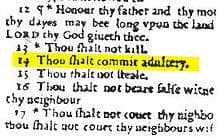
In his book The Signal and the Noise, Nate Silver talks about the proliferation of information following the invention and history of the printing press and the potential for misinformation and errors. One example he picks out is a 1631 edition of the Bible containing the unfortunate typo “Thou shalt commit adultery”. As mistakes go, it is a proper humdinger, and undoubtedly one of the worst typos in history. The rogue edition became known as the Wicked Bible, the Adulterous Bible or the Sinners’ Bible and the Archbishop of Canterbury weighed in to express his anger at the error.
The same publication is also alleged to have contained a second misprint with the word “greatness” printed as “great-asse”, so that a sentence in Deuteronomy 5 reads “Behold, the Lord our God hath shewed us his glory and his great-asse”. Most copies of the Wicked Bible were destroyed as soon as the Ten Commandments error was discovered, and no copies containing the second error appear to have survived, which has led some to doubt whether it really occurred. At any rate, if you can get your hands on one of the few private copies of the Wicked Bible that are not owned by a museum, university or public library, it could earn you upwards of $40,000 judging by the last-known sales at Bonhams and Sotheby’s in 2015 and 2016. Such owners may dispute the idea that these were amongst the worst typos in history; they certainly aren’t for them.
And the omission of that innocent word “not” is far from unusual. Wikipedia notes that until 2004 the Associated Press style guide recommended using “innocent” rather than “not guilty” to avoid exactly this type of mistake when describing acquittal judgements.
Pity poor Robert Barker, the printer who produced the Wicked Bible, his print shop had prior form for unfortunate errors having previously created an edition of the Bible that confused Judas with Jesus. This rogue edition; contains the text “Then Judas said to the twelve …”, where it should say ‘Jesus’. In many editions, the error has been fixed, apparently by the printers themselves, by means of a piece of paper pasted over the incorrect name, or simply with the name inked out and corrected underneath. A rare uncorrected edition is owned by the University of Illinois.
Anyone who regularly produces written content will recognise that sinking feeling when you spot a typographic error in your text after you have submitted it. In fact, similar levels of anxiety can be achieved even when you do spot errors in good time, as your brain races to imagine all the locations where you might have missed humiliating gaffes. My brother jokingly refers to “erotic spelling” instead of “erratic spelling”, which I sometimes forget is not immediately understood to be a humorous play on words by those outside my immediate family. A similarly unfortunate error blighted the entry for a travel agency in Yellow Pages, suggesting they offered “erotic” rather than “exotic” holiday packages. That one little letter is said to have cost Yellow Pages $18m after the agency lost 80 percent of its business, and thus undoubtedly also qualifies as one of the worst typos in history.
About the Author
Alison Tunley
Alison is a seasoned freelance translator with over 15 years of experience, specialising in translating from German to English. Originally from Wales, she has been a Londoner for some time, and she holds a PhD in Phonetics and an MPhil in Linguistics from the University of Cambridge, where she also completed her First Class BA degree in German and Spanish… Read Full Bio








